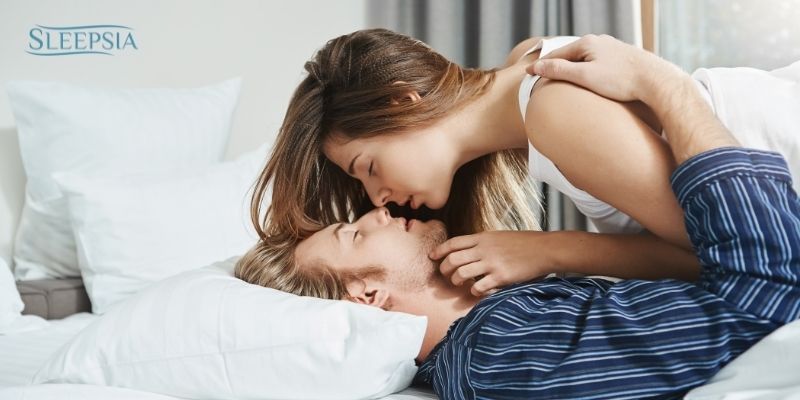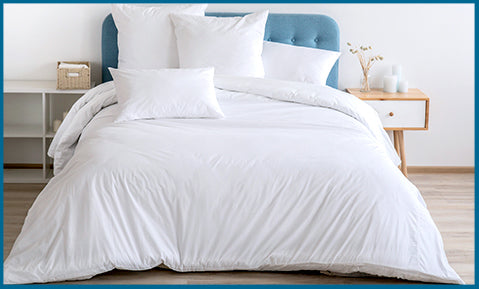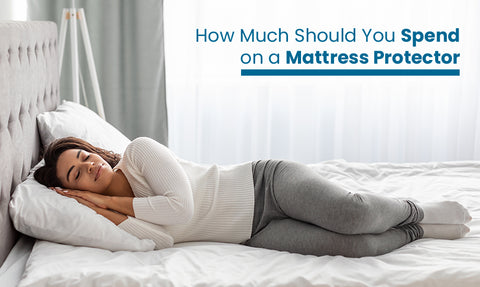
Because of a lack of good quality sleep, sleep deprivation has become a leading public health crisis. Constant reliance on devices, such as smartphones and laptops, stress from increased workload, and comparison to others on social media cause anxiety and depression.
Even though the amount of time we need to sleep differs among individuals, it is important to sleep until we’re completely rested.
Most healthy adults require seven to nine hours of sleep.
Impact of Sleep in Sex
Sexual dysfunction generally results from anxiety and stress. Anxiety, stress, and depression can lead to insomnia and sleep deprivation, altering the levels of hormones in our body.
When we experience stress, our body releases cortisol and adrenaline and suppresses the production of estrogen and testosterone, both of which are important sex related hormones.
This shift in hormone levels can lead to sexual dysfunction including:
- Decreased sex drive
- Erectile dysfunction
- Infertility
Generally, the nexus between sleep and sex is more prevalent in women as a result of:
- Menopause
- Postpartum lifestyle
- Pregnancy
And sleep deprivation doesn’t need a direct link to biology. It simply makes one tired, which causes individuals to lose interest in sex.
According to research, lack of quality sleep can lead to decline in:
- Romantic motivation
- Mood
- Libido
Impact of Sex on Sleep
Good sleep supports good sex. But let’s look at the inverse.
A healthy sex life, in fact, supports healthy sleep, which improves your sex life. And this positive cycle continues.
According to a 2017 study, people in 2010s were having sex at a rate of 9 fewer times per year than people in 1990s. Among the generations before Gen Z, millennials are having the least amount of sex.
And it’s not simply because of too much workload or pornography. Instead, the rate of steady relationships has fallen sharply, resulting in decreased rate of sex among the younger generation.
Since it’s pretty clear that sex and sleep are linked together, let’s look at underlying problems that may be causing trouble with your sleep.

Why can't you sleep?
Here are a few conditions that may decrease the quality of your sleep:
Sleep disorders
Sleep disorders are the leading cause of daytime drowsiness and inability to fall and stay asleep.
Insomnia
Within the United States, almost 25 percent of people suffer from insomnia, yet 75 percent of them don’t develop long-term symptoms.
Insomnia prevents you from falling or staying asleep. In the long-term, it may be chronic or intermittent.
Because of low quality and quantity of sleep, people develop other mental and physical health symptoms such as:
- Excessive daytime sleepiness
- Heightened emotions
- Irritability, anxiety, and frequent mood change
- Obesity
- Depression
- Nausea
- Diabetes
- Cardiovascular disease
Yet most often, it’s short term and caused by anxiety and stress. But it can also be a result of:
- Absence of regular exercise
- Use of drugs such as ecstasy or cocaine
- Jet lag
- Anxiety
- Depression
- Bipolar disorder
- Overactive thyroid
- Schizophrenia
- Sleep apnea
- Chronic pain
- GERD (gastrointestinal reflux disease)
Later in this post, you’ll find various relaxation techniques that may help relieve symptoms of insomnia.
Sleep Apnea
Types of sleep apnea include:
- Obstructive sleep apnea (OSA)
- Central sleep apnea (CSA)
Most people suffer from OSA, which results from blocked upper airways that prevent you from breathing. As a result, your breathing pauses, and you wake up gasping for air. And most of the time, you wake up for such a small time that you don’t even remember it.
This is why most people with OSA don’t realize that they have this medical condition until their partner or roommate points it out to them.
CSA, however, results from a dysfunction of your central nervous system. Your brain fails to signal to the muscles to continue breathing, so your breathing pauses, and you wake up.
Symptoms of obstructive sleep apnea include:
- Loud snoring
- Paused breathing
- Gasping and choking
- Noisy breath
Sleep apnea can result in:
- Insomnia or restless sleep
- Excessive daytime sleepiness
- Heartburn
- Headaches
- Dry mouth and sore throat
- Irritability
Consult your doctor if you think you have sleep apnea, as it is a serious medical condition that can lead to:
- Heart attack
- High blood pressure
- Depression
- Stroke
For obstructive sleep apnea, your doctor may prescribe a CPAP (continuous positive airway pressure) machine, which uses air pressure to keep your windpipe open while you sleep.
There are several custom made dental appliances available that shift your jaw to increase the area of your windpipe, but they can be uncomfortable for some people.
Restless leg syndrome (RLS)
RLS causes your legs to become restless. Constant twitching and discomfort in the legs forces people with this condition to move their legs to ameliorate the symptoms.
Unless the person moves his or her legs, he or she doesn’t get relief from the symptoms.
It affects 1 in 10 people at some point in their life and generally resolves on its own because of lifestyle changes.
It may be caused by stress and anxiety or by an imbalance in neurotransmitters, such as dopamine, serotonin, and neopheneprine.
If you have Restless leg syndrome, your doctor may prescribe:
- Iron supplements: iron deficiency can cause RLS, so to correct it, your doctor may prescribe a supplement.
- Gabapentin: gabapentinoids are mostly prescribed off-label for RLS.
- Benzodiazepines: affecting neurotransmitters in your brains, this class of medication may provide relief from symptoms of RLS.
- Dopamine agents: RLS symptoms can be a result of a lack of dopamine in your brain. So your doctor may prescribe medication that increases the amount of dopamine to provide relief.
Since RLS symptoms increase because of decreased levels of dopamine, you shouldn’t take melatonin supplements. If you find it difficult to sleep, simply wake up and take a walk for some time and then practice a few relaxation techniques provided later in this post.
Circadian rhythm disorder
Our body keeps track of 24-hour cycles via the circadian rhythm. Every 24-hour, the internal biological resets, unless there’s some underlying pathology.
Circadian rhythm disorders prevent the reset of the internal biological clock every 24 hour, so patients often can’t maintain a proper sleep schedule.
By resetting the circadian rhythm, melatonin can help people suffering from this condition to maintain a regular sleep schedule. You may also ask your doctor for other sleep medications.
Frequent night urination
People suffering from nocturia need to get up regularly at night to take a leak. Because of interruption in their sleep, they don’t get enough rest, resulting in drowsiness and excessive sleepiness in the morning.
It is important to get a diagnosis if you suffer from nocturia, as the condition usually withers as soon as the underlying cause is identified and treated.
People with nocturia should avoid diuretics, such as alcohol and caffeine, which cause excess dehydration, exacerbating the symptoms of nocturia.
Chronic pain
If you’re constantly in pain, it’ll become difficult for you to fall asleep. Chronic pain can result from:
- Arthritis
- Fibromyalgia
- Headaches
- Lyme disease
- Nerve damage from conditions such as diabetes
- Irritable bowel syndrome
- Cancer
There are several other medical conditions that cause chronic pain, and it can also result from surgery.
Chronic pain causes irritability, anxiety, and depression. It may even lead to suicidal thoughts.
If you suffer from chronic pain, then you can ask your doctor about medications that may relieve your symptoms. You can also try hypnosis, which is a type of meditation that’s proved effective at relieving symptoms of chronic pain.
Mental health disorders
Mental health disorders alter the levels of neurotransmitters in the brain, resulting in problems with both libido and sleep.
And as a result of social stigma, many people with mental health disorders don’t seek professional help until things get out of hand.
If you or someone you know suffers from mental health conditions, such as depression, anxiety, post-traumatic stress disorder, or bipolar disorder, then seeking professional help from a psychiatrist or certified psychologist is highly recommended.
Neurodevelopmental & neurodegenerative disorders
Anomalies in the CNS can cause imbalance in hormones and prevent you from sleeping or cause hypersomnia.
Autism, ADHA, Alzheimer’s disease, meningitis, and encephalitis, can lead to problems with sleep.
Conclusion
Sex and sleep are closely interlinked. One can have a profound effect on the other. So while you create more romance in your life, you should also focus on following good sleep hygiene to ensure that you get enough sleep and wake up well rested.
Recent Update on Sleep Apnea Increases Heart Problems: Study
One of the studies on sleep apnea recently highlighted that it worsens heart disease. The study was published in ‘Circulation’, the Association’s flagship journal. It is important to note that OSA (Obstructive Sleep Apnea) occurs in 40% to 80% of people with cardio-vascular disease.












